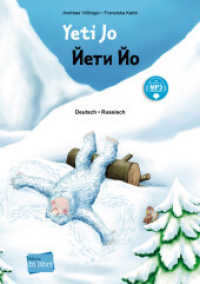- ホーム
- > 洋書
- > 英文書
- > Computer / General
Full Description
This book constitutes the refereed proceedings from the Third International Workshop on Foundation Models for General Medical AI, MedAGI 2025, held in conjunction with the 28th International Conference on Medical Image Computing and Computer Assisted Intervention, MICCAI 2025, in Daejeon, South Korea, during September 27, 2025.
The 19 full papers included in this book were carefully reviewed and selected from 31 submissions. The workshop aims to foster discussions that accelerate the transition from task-specific medical AI systems toward more generalized frameworks capable of addressing diverse tasks, datasets, and domains.
Contents
Lamps: Learning Anatomy from Multiple Perspectives via Self-supervision.- Segment Anything for Cell Tracking.- BioVFM-21M: Benchmarking and Scaling Self-Supervised Vision Foundation Models for Biomedical Image Analysis.- From Pathology to Radiology: Evaluating the Applicability of Pathology Foundation Models.- Pathology Foundation Models are Scanner Sensitive: Benchmark and Mitigation with Contrastive ScanGen Loss.- Improved Training Sample Efficiency and Inter-Device Generalizability in Optical Coherence Tomography Fluid Segmentation via Foundation Models.- Taming Stable Diffusion for Computed Tomography Blind Super-Resolution.- RadiSimCLIP: A Radiology Vision-Language Model Pretrained on Simulated Radiologist Learning Dataset for Zero-Shot Medical Image Understanding.- Improving Medical Visual Instruction Tuning with Labeled Datasets.- DR.SIMON: Domain-wise Rewrite for Segment-Informed Medical
Oversight Network.- The Data Behind the Model: Gaps and Opportunities for Foundation Models in Brain Imaging.- LGE Scar Quantification Using Foundation Models for Cardiac Disease Classification.- Beyond Broad Applications: Can Pathology Foundation Models Adapt to Hematopathology.- EndoTracker: Robustly Tracking Any Point in Endoscopic Surgical Scene.- Temporally-Constrained Video Reasoning Segmentation and Automated Benchmark Construction.- Cross-Modal Knowledge Distillation for Chest Radiographic Diagnosis via Embedding Expansion, Reconstruction, and Classification.- Random Direct Preference Optimization for Radiography Report Generation.- Test Time Adaptation of Medical Vision-Language Models.- MaskedCLIP: Bridging the Masked and CLIP Space for Semi-Supervised Medical Vision-Language Pre-training.








